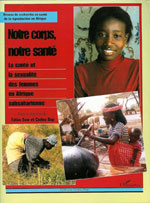Body Image
In Translation: Skin Whitening: At What Cost?
The "In Translation" sidebars in the 2011 edition of Our Bodies, Ourselves highlight the work of our global partners who develop health resources based on Our Bodies, Ourselves for their own communities.
 |
Group: Groupe de Recherche sur les
Femmes et les Lois au Sénégal (GREFELS)
Country: Senegal
Resource: Notre Corps, Notre Santé
(Our Body, Our Health), inspired by
Our Bodies, Ourselves for French-speaking Africa |
The use of cosmetic products to bleach or lighten the skin is a growing issue worldwide, with products heavily marketed in Africa and South Asia, as well as throughout Japan and some Caribbean countries. Lighter skin is not only portrayed as a beauty ideal but also associated with higher economic and social status.
In countries such as Tanzania, the skin-whitening industry is worth millions. Creams cost the equivalent of $4 to $10 each, a huge sum of money in a country where the average daily wage is less than $1. The products are dangerous as well as costly.
Our Bodies Ourselves’ partner in Senegal—Groupe de Recherche sur les Femmes et les Lois au Sénégal (GREFELS)—has found that many African women who lighten their skin do so despite being aware of the risks to their health. In the Our Bodies, Ourselves for French-speaking Africa, GREFELS explicitly challenges skin-whitening practices, drawing special attention to possible cancers caused by bleaching.
The authors note in the preface that the book aims to provide African women with knowledge to take care of and appreciate their bodies. “An important part of the book,” they write, “is about the representations men and women have about women’s bodies, health, and sexuality, about the way women’s bodies are used, taken care of, dressed, and/or violated.”
While some countries are trying to minimize skin bleaching, specifically by bans on sales, GREFELS believes that a deeper critique of the constellation of factors that influence the health and identity of women and girls in African society is imperative and long overdue.
Excerpted from the 2011 edition of Our Bodies, Ourselves. © 2011, Boston Women's Health Book Collective. Read other "In Translation" sidebars about women's groups from around the world who are adapting Our Bodies, Ourselves and creating resources to advance the health and human rights of women and girls in their countries. Find out more about GREFELS.
< Return to Body Image Overview
|




